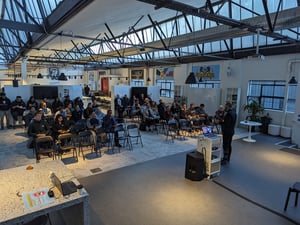It was truly energising to hear from a product expert and all round good human, Christian Idiodi today about bringing a product mindset into agile delivery.

Christian took us back to the agile manifesto where that famed group of engineers "went to a ski resort and didn't ski" and spoke to the current trend of "doing Agile" rather than "being agile" and that "agile alone is not enough". He reiterated that Agile is a powerful methodology to help build things faster, but doesn't guarantee that you are building the right thing - unless you build discovery into the delivery process and do discovery well to validate what you put into the delivery cycle.
Here are some of the key takeaways:
Understand the 'Why'
The first step to embedding a product mindset into Agile delivery is understanding the 'why'. Achieving product success is more than just the 'what' and the 'how'. Start by falling in love with the problem that needs to be solved, understand the problem space deeply and iterate on the solutions with customers who face that problem and want a solution to the problem. A clear product vision steers the agile team in the right direction and ensures alignment with the product's mission and goals.
Talk to your Customers
You can’t be product-led if the product team doesn’t know the customer deeply. The most influential person in a company is the person who understands the customer problem the most deeply. True product value comes from using technology to solve real pain points. Teams need to build empathy with their customers to ensure the best decisions are made.
Continuous Learning & Iteration
Prototype, test and learn - do this 10 or 20 times in a week. "We need to fake it, discovery, then we need to make it, delivery". All successful products have a graveyard of failed experiments - ideally these failures happen fast and cheaply. Discover and validate before building, and have the engineers involved so you build it with technology that is available and viable.
The Importance of Cross-Functional Teams
"It is a waste when we just tell the engineers what to do". Cross functional collaboration is crucial and a diverse team with a variety of skills can lead to more innovative and holistic solutions. By promoting an environment where everyone feels their expertise is valued and their voice is heard, teams can leverage their collective skills to enhance product value.
Ultimately, value is the most important thing - we exist to solve problems on behalf of humans and solving those problems is a team sport. Innovation is everyone's role.

